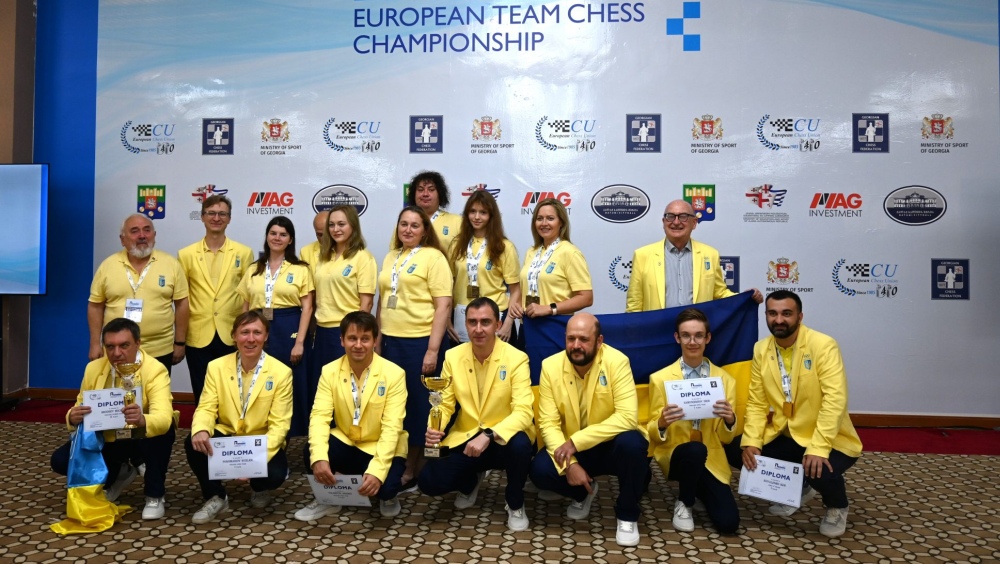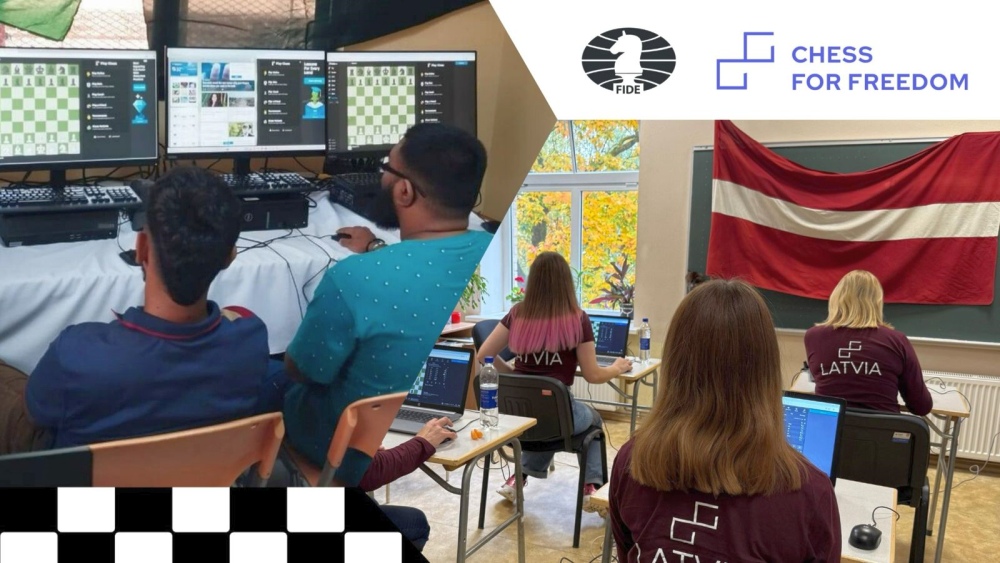Ukraine and Poland crowned European Team Champions 2025

The European Team Chess Championship 2025 concluded on October 14 in Batumi, Georgia. A dramatic final round decided the winners in the open section as Ukraine and Azerbaijan entered it tied for first place. Azerbaijan faced Serbia, while Ukraine took on England. The higher-rated Azerbaijani team were favourites against Serbia, but the Serbians delivered a convincing 3–1 victory. GM Alexey Sarana (SRB, 2661) defeated GM Shakhriyar Mamedyarov (AZE, 2742), GM Aleksandar Indjic (SRB, 2618) outplayed GM Rauf Mamedov (AZE, 2655), and GM Robert Markus (SRB, 2535) overcame GM Aydin Suleymanli (AZE, 2614). GM Eltaj Safarli (AZE, 2630) was the only Azerbaijani to score, defeating GM Velimir Ivic (SRB, 2638). Serbia’s victory secured them a medal. With this result, Ukraine needed only a 2–2 draw against England to clinch the title. They already had the upper hand, as GM Ihor Samunenkov (UKR, 2568) held a decisive advantage against GM Luke McShane (ENG, 2614), while GM Anton Korobov (UKR, 2596) and GM Igor Kovalenko (UKR, 2669) both had extra material in drawish rook endgames. The first-board game between GM Ruslan Ponomariov (UKR, 2633) and GM Nikita Vitiugov (ENG, 2654) had already ended in a draw. Samunenkov eventually converted his advantage into a full point, while the other two games were drawn, allowing Ukraine to clinch the title with 15 match points. Azerbaijan and Serbia tied for second place with 13 match points, but Azerbaijan had superior tiebreaks to claim the silver medal, while Serbia took bronze. Final standings – Open In the women’s section, Poland won the European Women’s Team Chess Championship 2025 after defeating Azerbaijan in the final round. IM Oliwia Kiolbasa (POL, 2388) outplayed IM Gulnar Mammadova (AZE, 2323), while IM Alina Kashlinskaya (POL, 2450) and IM Klaudia Kulon (POL, 2336) drew solid games against IM Khanim Balajayeva (AZE, 2351) and WIM Ayan Allahverdiyeva (AZE, 2220), respectively. IM Aleksandra Maltsevskaya (POL, 2394) also drew her rook endgame with an extra pawn once it became clear that her team had secured the match victory. With a final score of 16 match points, Poland claimed gold. Ukraine — the only team to defeat the champions — took silver with 14 match points after a 2–2 draw against Armenia in the final round. Despite a final-round loss to Bulgaria, Germany secured the bronze medal with 13 match points. Final standings – Women The best individual players by board are: Open Board 1 (Open): GM Richard Rapport; 2.GM Vincent Keymer, 3.GM Anish Giri Board 2 (Open): GM Alexey Sarana; 2.GM Jorden Van Foreest; 3.GM Laurent Fressinet Board 3 (Open): GM Eltaj Safarli; 2.GM Aleksandar Indjic; 3.GM Jones Gawain Maroroa Board 4 (Open):GM Igor Kovalenko; 2.GM Lorenzo Lodici; 3.GM Dimitrios Mastrovasilis Board 5 (Open):GM Ihor Samunenkov; 2.GM Isik Can; 3.GM Frederik Svane Women Board 1 (Women): IM Mai Narva; 2.IM Stavroula Tsolakidou; 3.GM Alexandra Kosteniuk Board 2 (Women): GM Anna Ushenina; 2.IM Sabrina Vega Guiterrez; 3.WGM Hanna Marie Klek Board 3 (Women):IM Oliwia Kiolbasa; 2.IM Lela Javakhishvili; 3.IM Ann Matnadze Bujiashvili Board 4 (Women): 1.GM Bella Khotenashvili; 2.GM Natalia Zhukova; 3.IM Gulnar Mammadova Board 5 (Women): WGM Kateryna Dolzhykova; 2.WFM Bozhena Piddubna; 3.WIM Silvia-Raluca Sgircea The closing ceremony was attended by the ECU President Zurab Azmaiparashvili, Head of Adjarian Autonomous Republic Sport Department Irma Nizharadze, ECU Vice Presidents Malcolm Pein, Gunnar Bjornsson, and Alojzije Jankovic, ECU Commercial Chief Adviser Moshe Slav, President of the Azerbaijan Chess Federation and FIDE Vice President Mahir Mammedov, President of the Georgian Chess Federation and FIDE Special Task Director Akaki Iashvili, and other distinguished guests. Text and photos: European Chess Union Official website: etcc2025.com/
Record number of teams and countries compete in FIDE Intercontinental Online Chess Championship for Prisoners

What began as a modest chess programme in a Chicago jail has grown into a worldwide movement. The fifth edition of the FIDE Intercontinental Online Chess Championship for Prisoners has set a new participation record, with 135 teams from 57 countries competing between 14th and 16th October. The first chess programme for inmates and detainees was launched by the Cook County Sheriff’s Office in Chicago in 2012. In 2019 they organised their first international tournament. Two years later, they partnered with FIDE. Since 2021, the International Chess Federation and Cook County Sheriff’s Office have been working together on the “Chess for Freedom” programme, aimed at inmates across the world, helping them learn essential life skills through chess. The central event of the programme is the FIDE International Online Chess Championship, which has over the years attracted teams from nearly 60 countries worldwide. The event is held around the mid-October to coincide with the celebration of the International Day of Education in Prison. Observed on 13th October, it highlights the importance of education in correctional facilities as a fundamental human right and a pillar for rehabilitation and improvement. The fifth edition of the Championship for Prisoners takes place between 14th and 16th October and is one of the final events in the Year of Social Chess, which highlighted the role of chess as a tool for inclusion and empowerment. The competition is split into three stages – the group stage (14th), the championship stage (15th) and the finals (16th). This year set a new record, with 135 teams from 57 countries taking part. The lineup includes 89 teams in the Open section, 26 in the Women’s, and 20 in the Youth. Several countries are making their debut, among them Eswatini, Guyana, Lesotho, Poland, Aruba, and St. Kitts and Nevis. Each team has four players, and the games are played entirely online with 10 minutes for each player plus a five-second increment from move one. “We all make mistakes in life. But as long as we are alive, we can learn” The event was opened by FIDE President Arkady Dvorkovich, who said that playing chess offers a direct path to self-motivation, logical thinking, stress reduction, and foresight of consequences, all “important pillars for a good life”. “We are all human. We all make mistakes in life. But as long as we are alive, we have a chance to learn from them and correct them. It takes a lot of courage to change, and that is why I want to warmly welcome you all on behalf of the entire chess community and thank you for taking part in this event”, said Dvorkovich in his message to the players. Dana Reizniece, the Managing Director and Deputy Chair of the Management Board of FIDE, who has been deeply involved in social chess programmes around the world, explained why the governing body of chess decided to engage in this project. “Chess teaches us focus, resilience and consistency. It sharpens the mind and allows us to channel the energy in a constructive way. Chess also gives hope. Hope that growth is possible, hope that change is possible.” Global coverage This year’s event is accompanied by a live broadcast which started at 6 AM CET and finished around 8 PM CET – nearly 13 hours in total. Apart from live commentary of the games, the broadcast featured special reports, presentations, and live conversations with guests from Australia to America who spoke about their experiences with the Chess for Freedom project. The life of a chess player in prison: Experiences from Australia to U.S. Tom Noiprasit works as an Education Services Coordinator at the Macquarie Correctional Centre, a maximum-security prison for male offenders located in Wellington, in the Orana region of western New South Wales, Australia. The facility has had a chess team for the past five years. A software engineer and former consultant, Noiprasit moved to teaching before taking a position at the Macquarie Correctional Centre. He noted that a common misconception people have is that education in prison is about “fixing people,” when it is more about helping them develop skills. As Noiprasit explains, the ambitions of people in prison are not much different from those on the outside – they want a job, a career, and they want to have a house to build their own life around. “Our job is not to judge people in prison but to make sure when they come out, they can choose to be what they want to be.” Different prisons have different rules when it comes to using computers for chess or anything else. In most cases, prisons do not allow inmates to use computers. Instead, they are given books and magazines where they can read about chess games and analyse. “It helps them talk to one another and practice social skills as well,” Noiprasit noted. While access to the internet seems like an everyday thing for most people, it’s not the case for those behind bars. “Access to the internet is a big thing and you need to be fully supervising this,” says Noiprasit. Prison officials also have to check very carefully who should be permitted to access the internet. “It could be anything – using the internet could bring up trauma, or an inmate who usually might not do a wrong thing might be tempted to do it.” “Emotional self-regulation and, in particular, the ability to let go are the main skills relevant for inmates when it comes to chess,” Noiprasit concluded. In Singapore, Grandmaster Goh Wei Ming – who visits prisons once a week to play chess – pointed out that “all inmates who participated in the Chess for Freedom programme exhibited much better behaviour, according to prison officers.” “We had a case of a player who had very high blood pressure. When he was playing for the first time, he had a counsellor with him, reminding him to look after his blood pressure. Two years into the programme, he is now much calmer and
FIDE Social Chess Storytelling Challenge: Deadline extended

FIDE has extended the deadline for submissions to the FIDE Social Chess Storytelling Challenge 2025. Participants now have until November 30, 2025, to submit their stories under the theme “Every Move Counts.” The challenge invites filmmakers, educators, and chess promoters worldwide to showcase how chess is changing lives and strengthening communities. From classrooms and rehabilitation centers to local clubs and public spaces, these stories reveal how the game can inspire growth, connection, and inclusion. Participants can enter two categories; Professional or Grassroots (Amateur), and are encouraged to submit short films that highlight the social impact of chess in creative and authentic ways. Winners in each category will receive a FIDE trophy and an invitation to the Opening Ceremony of the 2026 Chess Olympiad, including accommodation for two nights for two guests. Selected stories will also be featured during the 2025 FIDE Social Chess Conference and promoted across FIDE’s official media channels. Participation is open to everyone, regardless of age or nationality. New submission deadline: November 30, 2025 Submit your film here: fide.com/social2025-storytelling-challenge/#send

